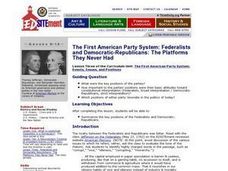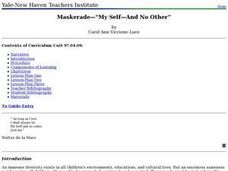Curated OER
My Action Plan
Twelfth graders work on completion of their personal Action Plan. They write down the due date on their Action Plan and view sample Action Plans in order to have a better understanding of what theirs should look like. After assessing how...
Curated OER
Goldilocks Revisited
Second graders investigate the story of "The Three Bears" while focusing on the character of Goldilocks. They answer key questions that are focused upon the development of positive feelings and reactions. Students discuss the possible...
Curated OER
Communication Through Photography
Eighth graders analyzed photos, which were used to complete a group story with photo. The project was designed to develop skills in and positive attitudes toward reading, writing, and oral presentations.
Curated OER
A Mural Gift
Students listen as the teacher tells about the life of Keith Haring. Using drawing paper and pencils, they sketch figures and shapes in the style of K. Haring. They discuss the mural with students, and they vote on colors to use....
Council for the Curriculum, Examinations and Assessment
Learning About Learning
Successful people know that they never stop learning. Eighth graders explore their preferred ways to learn new information with a reflective lesson about learning styles, that features surveys, writing prompts, and...
Council for the Curriculum, Examinations and Assessment
Feelings and Emotions
Eighth graders express their emotions with a set of activities about self reflection and feelings. With a set of emotion cards and a worksheet that details negative thought patterns, the resource empowers young learners to discover and...
Curated OER
Introduction to Calculus
Twelfth graders discuss attitude necessary to be successful in calculus. In this calculus instructional activity, 12th graders review famous quotes about success to help them get motivated to learn and be successful in the classroom....
Curated OER
American Frontiers
Students study the settlement of the American frontier through literature. In this literature lesson, students read and discuss works by James Fenimore Cooper, Bret Harte, Mark Twain, Willa Cather, and Hamlin Garland. Students compare...
Curated OER
The First American Party System: Federalists and Democratic-Republicans: The Platforms They Never Had
High schoolers investigate the beginnings of the political party system in the US. They determine the key positions of both the Federalists and the Democratic-Republicans. They compare the views of the early political parties with those...
Curated OER
I Like Me and I Like You
Students use the book "I Like Me!" to create a context for investigating self-concept (how one feels about self). They have the objective of realizing their rights and responsibilities. Students work in small groups conducting interviews...
Curated OER
Maskerade, My Self, And No Other
Students examine themselves, discover their strong, positive attributes, and recognize areas in need of improvement (since each individual possesses strengths but all people have some weaknesses). They develop self-acceptance, trust in...
Curated OER
Center Stage—Focus on Poverty
Students explore the concept of philanthropy. In this service learning lesson, students examine stereotypes and discrimination based on socio-economic status. Students prepare to work with people of diverse backgrounds in service...
Curated OER
War and Religion
Students analyze perspectives of war. In this war and religion lesson, students collaborate to research anti-war and pacifist positions on war as well as "just war" theory. Students compose essays regarding perspectives of war.
Curated OER
Soccer Fever Gets Hot
Young scholars examine rules of soccer, focusing on basic skills necessary to play, create imaginary team, match players with positions that best fit their skill levels and personalities, and practice new skills with classmates.
Curated OER
Eatem Up!
Students identify, interpret and demonstrate a positive learning attitude. They identify, comprehend and use basic concepts and skills and then, communicate clearly in oral, artistic, written, and nonverbal form. Students also identify...
Curated OER
The Battle Over Reconstruction: The Aftermath of War
Students explore public sentiment regarding Reconstruction. In this Reconstruction lesson plan, students analyze primary sources for evidence of the political, social and economic stability of the U.S. following the Civil War....
Curated OER
Assessing Self-Concept
Eleventh graders complete a self-assessment worksheet. They discuss the worksheet and write their responses. Students create a personalized list of things they can improve or maintain their positive self-concept. Students create a list...
Curated OER
Making Choices
Fifth graders identify their personal interests and behavioral choices. They explore how these choices affect school and family situations. Consequences of their choices are examined.
Curated OER
Inside the Vault-Entrepreneurship
High schoolers explore entrepreneurship. For this economic study lesson, students take a pretest on attitudes, review characteristics that make up an entrepreneur, review a list of famous entrepreneurs, and create a 5 minute oral...
Curated OER
Cooperative Learning
Learning can be structured competitively, so that students work against each other; individually, so that students work alone; or cooperatively, so that students work together to accomplish shared learning goals.
Curated OER
Health Education: An Integrated Approach; A Day Without Sight
Fourth graders hypothesize about the difficulties they may encounter if they did not have their sense of sight, in order to establish a sense of empathy for the disabled. In this lesson plan on senses, 4th graders record all of the...
Curated OER
Working With Parents
Student teachers learn the importance of understanding the family dynamics of their students to effectively communicate academic and behavioral concerns.
Curated OER
Work and Responsibility
Third graders investigate the responsibilities related to various careers.
Curated OER
Language Arts: Novel Guides
Students discuss the Revolution and consider the causes of the war, the attitudes of the colonists, and the position of the British. Then students explore American involvement in wars since the country's inception.

























